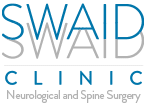
Brain Surgery
Surgical Lesions of the Head and Brain
You have been diagnosed with a condition requiring surgical intervention. Your doctor has explained to you your specific diagnosis, possible causes and treatment options.
What is the procedure?
Surgery involves putting you to sleep under general anesthesia. Depending on the area of your particular abnormality, your head may be totally or partially shaved. An incision will be made in a fashion described to you by your doctor. Your surgery will last several hours, and you will then be monitored in the recovery room before being transferred to the intensive care unit. Your incision will be closed in multiple layers, with staples or sutures applied to the skin. A dressing will be applied. Your hospital stay may last two to five days. This will be determined by your specific diagnosis and postoperative progress.
Pre-Operative Instructions
Your admission will be registered with the hospital by our office. We will contact your insurance company for pre-certification requirements. You will be responsible for inquiring whether or not a second surgical opinion is required by your insurance.
The evening before your surgery – Do not eat or drink anything after 10:00pm. This includes gum, mints, cigarettes, and your morning coffee. The anesthesiologist will not administer anesthesia if you have had anything by mouth after midnight, and your surgery will have to be postponed. If you are on any blood thinners, steroids or NSAIDS (aspirin, Coumadin, ibuprofen, Aleve, BC, Goody powders, etc), these must be discontinued one week prior to surgery. Steroids must be discontinued in tapering doses. You also need to stop taking over the counter vitamins and supplements one week prior to surgery. If you are not sure about your medication, please contact our office. Please notify our office if your medical condition has changed since your last office visit, or if you develop a fever, rash, vomiting, diarrhea or productive cough.
The morning of your surgery – Do not eat or drink anything! Do not wear make-up, contact lenses, hair pins, etc. Leave all jewelry and valuables at home. Please remove any body piercings and dark fingernail polish. Arrive promptly at your scheduled time. If you are late, your surgery may have to be cancelled or delayed. Bring your daily medications with you or bring a list that includes the names of the medication, dosage and when you take them. If you have a living will, please bring a copy to go with your chart. You will be given a hospital gown to change into, however, after surgery you may change into your own pajamas or clothes.
Lab Work
Each patient undergoing a surgical procedure is required to have preoperative blood work, including an HIV screen and a hepatitis panel drawn before surgery. This must be done at least one week before surgery, but no greater than two weeks. You will need to bring your driver’s license and insurance cards to your appointment.
Recovery
After your surgery is finished, you will be moved to the recovery room and then to the intensive care unit. During this time, you will be closely monitored by nurses and anesthesia staff. Friends and family are not allowed to visit in the recovery room. Friends and family may visit during scheduled visiting times while in the ICU. Please limit visitors to two at a time. Usually one to two days after surgery you will be transferred to a step-down unit where your friends and family can spend more time with you. However, the amount of rest you get is very important to your recovery, so limit the number of visitors while you are in the hospital.
Dressing Care
Your incision will be covered by either a local dressing or a head wrap. You should not get the dressing wet, therefore, sponge bathe until you come back to the office. Your incision should remain covered. If the original dressing should come off, or if your skin becomes irritated from the tape, apply a new dressing. The dressing and staples/sutures will be removed at your postoperative visit approximately 9 to 14 days after surgery. After your staples/sutures are removed, you may get your incision wet. The area of the incision will not have a dressing on it after this visit. It is fine to wear a hat or scarf. It is normal for your incision to be sensitive for a few days. If you notice any excessive redness, discharge or have a fever greater than 102°, please contact the office.
Leaving the Hospital
Upon discharge from the hospital you will be given instructions on activities and restrictions for the following week. You must call the office at (205) 949-1800 to set up your appointment to have your staples removed 9 to 14 days from surgery if you have not already been given an appointment date and time. Prescription(s) will also be given to you upon discharge. You need to make arrangements for transportation home, as you will not be allowed to drive
Return to Daily Activities
For about the first week following surgery, you will need to rest and do as little activity as possible. You will probably feel sore and stiff. By week two, however, you should begin to feel less pain and stiffness. During the second postoperative week, you should be able to take short walks, go out to eat or go shopping. Do not do any strenuous activities including lifting, stretching, bending, pushing or pulling. Gradually over the next few weeks, you will be able to progressively increase your activities. Use the following as a guideline:
- Driving. You may drive approximately three to four weeks after surgery, when approved by your doctor. You should not plan to travel for long distances for at least one month after surgery. If you have had seizures prior to surgery, you may not be able to drive for several months. Please check with your doctor.
- Working. If your job involves manual labor, you should not plan to return to work for four to six weeks following surgery. At your four-to-six week return office visit, the doctor will assess you and determine at what point you may return to work. If you have a predominantly sedentary job, you can plan to return to work, most likely part time, after two to three weeks. Caution and common sense should be used to determine whether or not you should engage in any activity.
- Sexual activity. You should abstain from sexual activity for at least two to three weeks following surgery. After this time you may resume your normal sexual activities as you feel able.
- Exercise. Resuming exercise should be done carefully. Do not exercise during the first week after surgery. You may resume walking after one week following surgery if it is comfortable for you to do so. Do not participate in any aerobic type activity (including tennis, golf, etc) or contact sports for three months following surgery.
Pre and Post-Operative Questions
If you have further questions regarding your scheduled procedure, please contact our office Monday through Thursday between 8:00am and 4:00pm.
If you experience any signs or symptoms which cause you concern, please contact our office at (205) 949-1800 during office hours. After-hours calls will be directed to the answering service. This document should be used as a general information guide only and should not be used in lieu of medical treatment. As individual conditions vary, always contact your doctor regarding your health care.
Areas of Expertise
Cervical Spine
Cervical Spine Surgery involves putting you to sleep under general anesthesia. A small incision will be made in a crease in your neck, just above the collar bone.
Lumbar Spine
The procedure most often performed is a lumbar microdiskectomy. Dr. Swaid Swaid has performed over 5,000 of these operations during the 35 years he’s been in practice which makes him one of the most experienced neurosurgeons in our region.
Trigeminal Neuralgia
Trigeminal neuralgia is a debilitating ailment and is considered to be one of the most painful conditions patients can experience. It is a disorder of the V cranial nerve.
Concussions
A concussion is a type of brain injury where there is a change in a patient’s consciousness without structural damage to the brain as a result of some type of trauma to the head or body.
